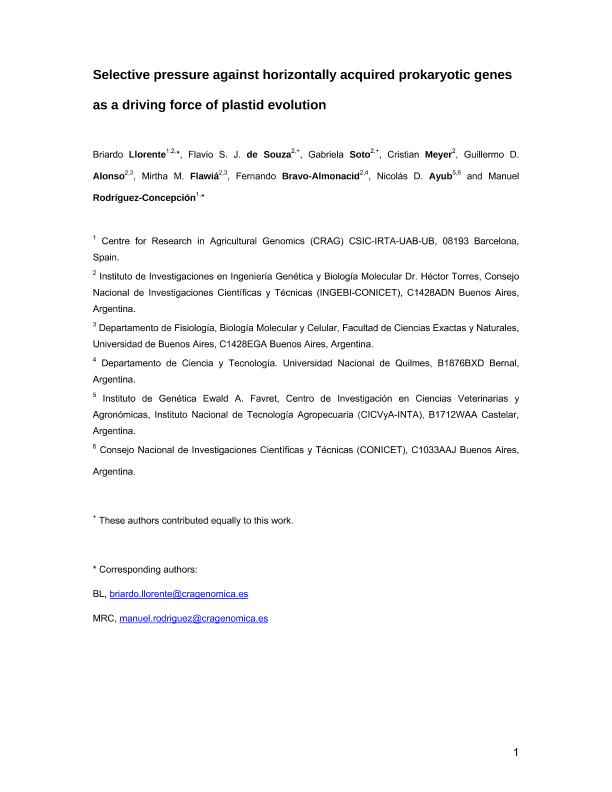Artículo
Selective pressure against horizontally acquired prokaryotic genes as a driving force of plastid evolution
Llorente, Briardo ; Silva Junqueira de Souza, Flavio
; Silva Junqueira de Souza, Flavio ; Soto, Gabriela Cynthia
; Soto, Gabriela Cynthia ; Meyer, Cristian Germán
; Meyer, Cristian Germán ; Alonso, Guillermo Daniel
; Alonso, Guillermo Daniel ; Flawia, Mirtha Maria
; Flawia, Mirtha Maria ; Bravo Almonacid, Fernando Felix
; Bravo Almonacid, Fernando Felix ; Ayub, Nicolás Daniel
; Ayub, Nicolás Daniel ; Rodríguez Concepción, Manuel
; Rodríguez Concepción, Manuel
 ; Silva Junqueira de Souza, Flavio
; Silva Junqueira de Souza, Flavio ; Soto, Gabriela Cynthia
; Soto, Gabriela Cynthia ; Meyer, Cristian Germán
; Meyer, Cristian Germán ; Alonso, Guillermo Daniel
; Alonso, Guillermo Daniel ; Flawia, Mirtha Maria
; Flawia, Mirtha Maria ; Bravo Almonacid, Fernando Felix
; Bravo Almonacid, Fernando Felix ; Ayub, Nicolás Daniel
; Ayub, Nicolás Daniel ; Rodríguez Concepción, Manuel
; Rodríguez Concepción, Manuel
Fecha de publicación:
01/2016
Editorial:
Nature Publishing Group
Revista:
Scientific Reports
ISSN:
2045-2322
Idioma:
Inglés
Tipo de recurso:
Artículo publicado
Clasificación temática:
Resumen
The plastid organelle comprises a high proportion of nucleus-encoded proteins that were acquired from different prokaryotic donors via independent horizontal gene transfers following its primary endosymbiotic origin. What forces drove the targeting of these alien proteins to the plastid remains an unresolved evolutionary question. To better understand this process we screened for suitable candidate proteins to recapitulate their prokaryote-to-eukaryote transition. Here we identify the ancient horizontal transfer of a bacterial polyphenol oxidase (PPO) gene to the nuclear genome of an early land plant ancestor and infer the possible mechanism behind the plastidial localization of the encoded enzyme. Arabidopsis plants expressing PPO versions either lacking or harbouring a plastid-targeting signal allowed examining fitness consequences associated with its subcellular localization. Markedly, a deleterious effect on plant growth was highly correlated with PPO activity only when producing the non-targeted enzyme, suggesting that selection favoured the fixation of plastid-targeted protein versions. Our results reveal a possible evolutionary mechanism of how selection against heterologous genes encoding cytosolic proteins contributed in incrementing plastid proteome complexity from non-endosymbiotic gene sources, a process that may also impact mitochondrial evolution.
Palabras clave:
Plastid
,
Plant
,
Metabolism
,
Evolution
Archivos asociados
Licencia
Identificadores
Colecciones
Articulos(INGEBI)
Articulos de INST.DE INVEST.EN ING.GENETICA Y BIOL.MOLECULAR "DR. HECTOR N TORRES"
Articulos de INST.DE INVEST.EN ING.GENETICA Y BIOL.MOLECULAR "DR. HECTOR N TORRES"
Citación
Llorente, Briardo; Silva Junqueira de Souza, Flavio; Soto, Gabriela Cynthia; Meyer, Cristian Germán; Alonso, Guillermo Daniel; et al.; Selective pressure against horizontally acquired prokaryotic genes as a driving force of plastid evolution; Nature Publishing Group; Scientific Reports; 6; 1903; 1-2016; 1-10
Compartir
Altmétricas



